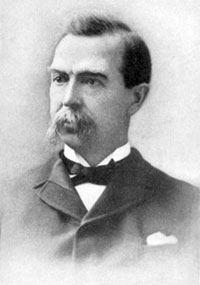
Timothy Field Allen
(1837-1902)
Timothy Field Allen was born in Westminster, Vermont. He received his undergraduate education at Amherst College and his medical degree from New York University.
After serving as a surgeon during the Civil War he returned to New York where he partnered with Dr. Carroll Dunham. He also studied homeopathy with Dr. P.P. Wells in Brooklyn.
In 1871 Dr. Allen was appointed professor of Materia Medica at the New York Homoeopathic Medical College. Later he served as president from 1882-1893. He obtained a $500,000 grant from Roswell P. Flower, which was used to build an addition to the college. This later became the Flower Fifth Avenue Hospital.
While professor and surgeon at New York Ophthalmic Hospital, Dr. Allen was responsible for its conversion to a homeopathic institution. He was also Director of a Homoeopathic Insane Asylum in Middletown, New York, which served as a research center for the homeopathic treatment of mental disease.
Dr. Allen compiled the Encyclopedia of Pure Materia Medica over the course of 10 years. It is a comprehensive record of all the provings of homeopathic medicines recorded up to that point.
The volumes were published between 1874 and 1879: Vol. 1 (Abies to Atropin), 1874; Vol. 2 (Aurum to Carduus), 1875; Vol. 3 (Carlsbad to Cubeba), 1876; Vols. 7 (Nicotinum to Plumbago), 8 (Plumbum to Serpentaria), 1878; Vols. 9 (Silica to Thuja), 10 (Tilia to Zizia), 1879.
Constantine Hering, Carroll Dunham, Adolph Lippe, and Richard Hughes all contributed to this monumental work (In a later four-page printing, publishing date unknown, Allen gave the number of the symptoms that had been clinically verified by Dunham). The volumes were offered by subscription. 500 subscriptions were obtained and paid in advance to assure each volume's publication.
For each remedy in the Encyclopedia the actual symptoms are preceded by a list of each prover, the dose they took, and the source of reference. Other sources of information, such as accidental poisonings, are also included.
The incomparable benefit of Allen's work is that the symptoms are recorded in the actual words of the prover. This averts the distortion of philosophical repertories such as Kent's, Synthesis, or the Complete, which fragment symptoms into separate parts and generalize specific symptoms.
Here is an excerpt from the famous proving symptom of Agaricus muscarius (as experienced by Krachemariskov), "He becomes so furious that he can hardly be restrained from ripping up his bowels, as he fancies the mushroom had ordered him to do."
In 1881 Allen published A Critical Revision of the Encyclopedia of Pure Materia Medica. It was a reprint of 16 pages from the North American Journal of Homeopathy. This small work is an errata for his larger work. It covers revisions to remedies from Agaricus to Carbo vegetalis. Dr. Allen published nothing similar for the rest of the remedies in the Encyclopedia.
Modern homeopaths consider Allen's Encyclopedia to be an essential reference. This wasn't always the case however. At the time of its publication, a review in the December 1879 Homeopathic Times, described the Encyclopedia as "Dr. Allen's gigantic and most discredible fiasco."
The review described the work as a
"...mass of trash, of wild vagaries, of symptoms which seem to have been gathered at random from every language under heaven, from every insane asylum in the land, and from nurseries where fond mothers take seriously to heart the symptoms and sayings of their young offspring.""Mixed with all this trash, the trained searcher may possible find the real gems of our therapeutics, for they are there; but they are often so covered with what is perfectly worthless, that a special training is necessary to evolve them from the surrounding rubbish."
Allen supposedly claimed responsibility for all the translations from the original German, but in the reviewer's inspection of the Nux vomica chapter, several gross translation errors were found.
For example, a literal translation of Hahnemann reads: "She regards the present pain as intolerable." Allen translated it as: "The usual pain seems intolerable."
Hahnemann says: "After midnight, very violent palpitation with extreme anxiety which impels him to suicide." Allen translates this as: "Extreme anxiety with violent palpitation which impels him to suicide."
The reviewer comments:
"...if we find a simple translation, from so important writer as Hahnemann, full of errors, what reliance can be placed on any of the editor's work?"
Julian Winston, who provides this commentary in The Heritage of Homoeopathic Literature, believes that the anonymous reviewer was probably Egbert Guernsey, one of the editors of the Journal.
In addition to his devotion to homeopathy, Dr. Allen was an accomplished musician and botanist. He served as organist for several local churches. He also was on the Board of Directors for the New York Botanical Gardens.
Dr. Allen dedicated 40 years of his life to the art and science of homeopathy. His legacy is preserved by our continuing reliance on his work.
Books by Dr. Allen:
- Ophthalmic Therapeutics (1874)
- The Symptom Register (1880)
- Handbook of Materia Medica and Homeopathic Therapeutics (1889)
- Boenninghausen's Therapeutic Pocket Book translator (1891)
- A Primer of Materia Medica (1892)
- Pocket Characteristics (1894)